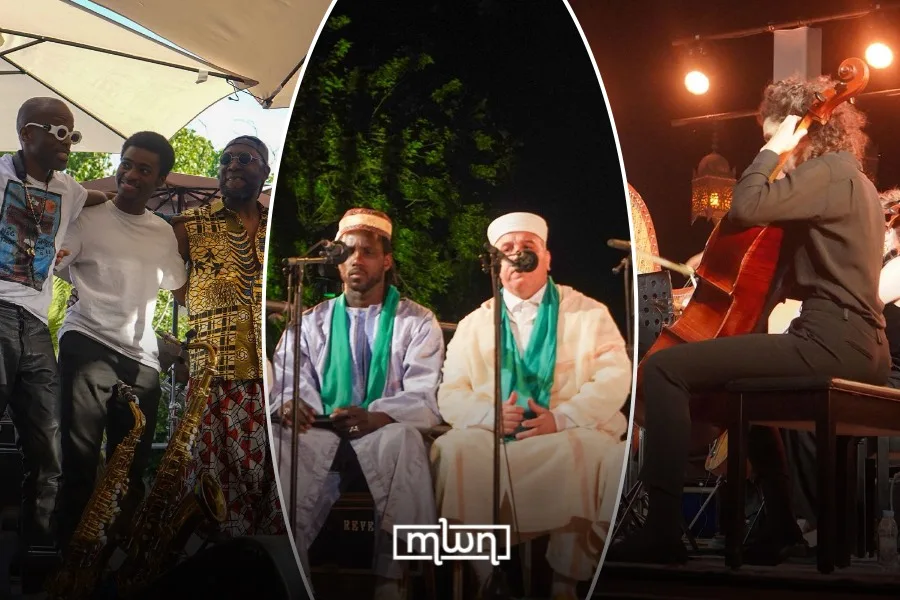Home > Africa > Jazz, Memory, and Migrant Mourning at the Fez World Sacred Music Festival
Jazz, Memory, and Migrant Mourning at the World Sacred Music Festival
Fez – Yesterday at Jnan Sbil, the Fez World Sacred Music Festival offered a transcendent experience that blurred the lines between the sacred and the political, the ancestral and the contemporary.
The 28th edition featured remarkable performances that each, in their own way, served as invocations of healing, memory, and spiritual resilience.
Jowee Omicil: Jazz as ceremony and ancestral breath
Opening the evening was Haitian-Canadian multi-instrumentalist Jowee Omicil, Jr., known artistically as Jowee BasH! A musical shaman of sorts, Omicil drew on his Haitian heritage, free jazz traditions, and gospel roots for SpiriTuaL HeaLinG, an improvisational, genre-defying performance.
With collaborators including jazz legends like Pharoah Sanders and Roy Hargrove in his artistic lineage, Omicil led his trio of singers and nine instrumentalists through an ecstatic rite that evoked the revolutionary spirit of the 1804 Haitian uprising and the avant-garde ethos of 1960s New York jazz.
More than a concert, it was a sonic liberation. Omicil refused fixed composition in favor of spiritual improvisation, in what he calls “written in the spirit.”
The result was a living ritual, a soundscape charged with ancestral memory and collective resilience. Inspired by the Bois-Caïman ceremony that sparked Haiti’s path to independence, this performance summoned unity, freedom, and sacred resistance, breathing what Omicil calls a “healing Haitian breath” into the Fez night.
Les Illuminations: A lament for the lost in “Le Jardin d’Afrique”
The second act brought an entirely different, yet equally moving, dimension to the evening.
“Le Jardin d’Afrique”, an oratorio conceived by ensemble “Les Illuminations” under the direction of composer Benjamin Attahir, performed a poetic and deeply human homage to the migrants who perish crossing the Mediterranean.
Inspired by the visionary Tunisian sanctuary created by artist Rachid Koraïchi, a cemetery for drowned migrants near Zarzis, the piece sets to music a libretto by Isabelle Junca and Aurélie Allexandre d’Albronn, giving voice to silenced stories.
Vocalists Joël Terrin (L’Architecte), Julie Mathevet (La Poésie), and Aimery Lefèvre (Le Destin) embodied grief, memory, and transcendence, supported by a chamber ensemble blending harp, archlute, flugabone, flutes, and bassoon.
A requiem both intimate and universal, Le Jardin d’Afrique echoes the sacred interweaving of cultures and faiths. Twelve vines for the apostles, five olive trees for the pillars of Islam, three ceramic spheres for the monotheistic religions, the cemetery’s design found its musical mirror in Attahir’s polyphonic, contemplative composition.
Fez and the Tijâniyya: A spiritual center of gravity
No place could be more fitting for such performances than Fez, a city that remains a vital node in the spiritual geography of the Muslim world.
Central to this is the Tijâniyya Sufi order, founded by Ahmad al-Tijânî in the 18th century. The movement, which quickly spread across North and West Africa, continues to shape the spiritual lives of millions, especially in Senegal, Mali, and Nigeria.
The mausoleum of Sheikh Ahmad al-Tijânî stands in the heart of Fez’s Medina, not far from Jnan Sbil itself. Pilgrims visit daily, seeking baraka (blessings), spiritual insight, and renewal. The Tijâniyya emphasizes direct divine presence, disciplined spiritual practice, and communal unity, values deeply mirrored in the music of both Omicil and Les Illuminations.
In bringing such performances to Fez, the Sacred Music Festival doesn’t merely entertain, it honors the city’s unique place in the global constellation of faith, resistance, and transcendence.
A night of sacred resonance
This night at Jnan Sbil was a passage through collective memory, ancestral energy, and spiritual invocation.
Whether through the mystical breath of Haitian jazz or the poetic lament of Mediterranean mourning, the artists reminded us that sacred music does not only belong to temples or texts. It lives where people gather in remembrance, in grief, and in hope.
Fez continues to be that place.
Your email address will not be published.
I agree to the Terms & Conditions and Privacy Policy.
Login to your account below
Fill the forms bellow to register
Please enter your username or email address to reset your password.
All Right Reserved © 2025 Morocco World News .
